Are you looking for a canine companion but dread the thought of constantly cleaning up dog hair? You’re in luck! There are numerous small dog breeds known for shedding very little, making them ideal pets for those who prefer a cleaner home. This guide explores various small breeds, from those that hardly shed to nearly non-shedding varieties, to help you find the perfect match for your lifestyle. Discover which breed is right for you.
Affenpinscher
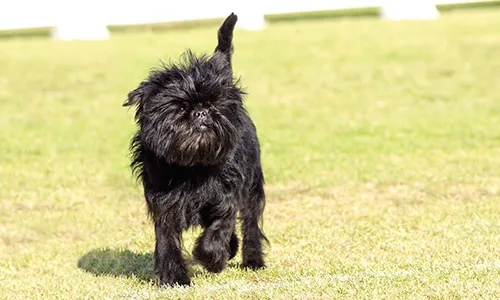 affenpinscherThe Affenpinscher, whose name translates to “monkey-like terrier,” lives up to its moniker with its intelligence and distinctive appearance. This small but fearless breed is an excellent watchdog, ensuring you’re always aware of unexpected visitors. The Affenpinscher boasts a wiry coat that sheds minimally and has a very faint “doggy” odor. A simple twice-weekly brushing with a slicker brush and comb is sufficient to maintain its charmingly shaggy look. This low-maintenance canine is also celebrated for its humorous personality.
affenpinscherThe Affenpinscher, whose name translates to “monkey-like terrier,” lives up to its moniker with its intelligence and distinctive appearance. This small but fearless breed is an excellent watchdog, ensuring you’re always aware of unexpected visitors. The Affenpinscher boasts a wiry coat that sheds minimally and has a very faint “doggy” odor. A simple twice-weekly brushing with a slicker brush and comb is sufficient to maintain its charmingly shaggy look. This low-maintenance canine is also celebrated for its humorous personality.
If you’re considering this breed, explore Affenpinscher puppies on the AKC Marketplace.
Basenji
For those who admire the characteristics of hounds but are not fond of their typical odor and shedding, the Basenji might be the perfect small dog breed. This breed sheds very minimally, and its short, fine coat requires little attention beyond occasional brushing. Basenjis are also known for being remarkably quiet, making them well-suited for apartment living, provided they receive sufficient daily exercise and playtime.
If you’re considering this breed, explore Basenji puppies on the AKC Marketplace.
Bichon Frise
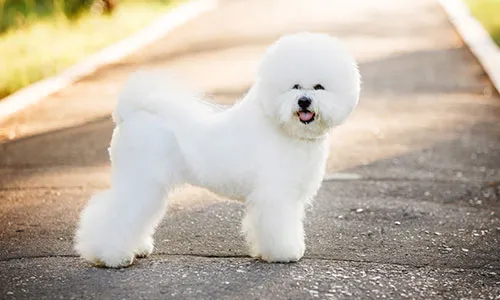 bichon friseThe Bichon Frise is a small dog breed that truly does not shed. These playful and affectionate dogs are an [ideal dog breed for people with allergies](https://dogcarestory.com/expert-advice/lifestyle/did-you-know/hypoallergenic-dog-breeds/), but they do require consistent grooming. The Bichon Frise’s hair grows continuously, necessitating frequent grooming, brushing, and occasional baths to maintain their signature powder-puff appearance.
bichon friseThe Bichon Frise is a small dog breed that truly does not shed. These playful and affectionate dogs are an [ideal dog breed for people with allergies](https://dogcarestory.com/expert-advice/lifestyle/did-you-know/hypoallergenic-dog-breeds/), but they do require consistent grooming. The Bichon Frise’s hair grows continuously, necessitating frequent grooming, brushing, and occasional baths to maintain their signature powder-puff appearance.
If you’re considering this breed, explore Bichon Frise puppies on the AKC Marketplace.
Bolognese
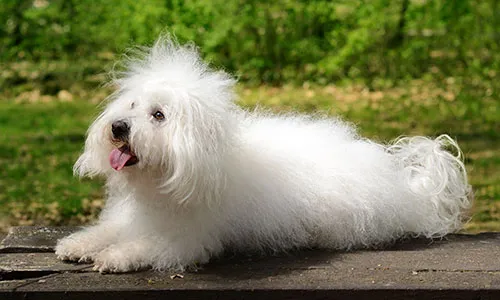 bologneseSimilar to the Bichon Frise, the Bolognese sports a distinctive fluffy coat composed of hair rather than fur. The Bolognese does not shed, though dead hair should be brushed out regularly. Their coat requires daily grooming to keep these charming lap dogs looking their best.
bologneseSimilar to the Bichon Frise, the Bolognese sports a distinctive fluffy coat composed of hair rather than fur. The Bolognese does not shed, though dead hair should be brushed out regularly. Their coat requires daily grooming to keep these charming lap dogs looking their best.
If you’re considering this breed, explore Bolognese puppies on the AKC Marketplace.
Brussels Griffon
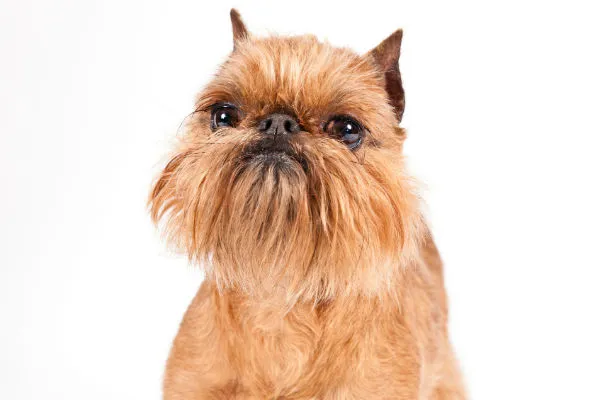 brussells griffonDespite its diminutive size, the Brussels Griffon is a robust dog that does not require excessive pampering. Both the smooth-coated and rough-coated varieties of this breed are minimal shedders and benefit from regular grooming. Their small stature means that a daily walk and indoor play sessions are typically sufficient to meet their exercise needs. This loyal breed thrives in households where family members are frequently present.
brussells griffonDespite its diminutive size, the Brussels Griffon is a robust dog that does not require excessive pampering. Both the smooth-coated and rough-coated varieties of this breed are minimal shedders and benefit from regular grooming. Their small stature means that a daily walk and indoor play sessions are typically sufficient to meet their exercise needs. This loyal breed thrives in households where family members are frequently present.
If you’re considering this breed, explore Brussels Griffon puppies on the AKC Marketplace.
Chinese Crested
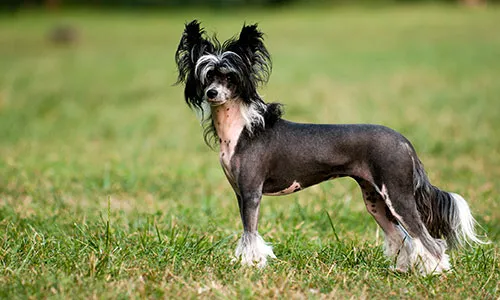 chinese crestedOne effective way to avoid shedding is to opt for a hairless small dog breed. The Chinese Crested comes in two coat types: hairless and powderpuff. The hairless variety has hair only on its head, tail, and feet, while the powderpuff is covered in a fine coat that sheds very minimally. Hairless dog breeds require specific skin care, needing protection from the sun and cold, and are more susceptible to skin irritations.
chinese crestedOne effective way to avoid shedding is to opt for a hairless small dog breed. The Chinese Crested comes in two coat types: hairless and powderpuff. The hairless variety has hair only on its head, tail, and feet, while the powderpuff is covered in a fine coat that sheds very minimally. Hairless dog breeds require specific skin care, needing protection from the sun and cold, and are more susceptible to skin irritations.
If you’re considering this breed, explore Chinese Crested puppies on the AKC Marketplace.
Coton de Tulear
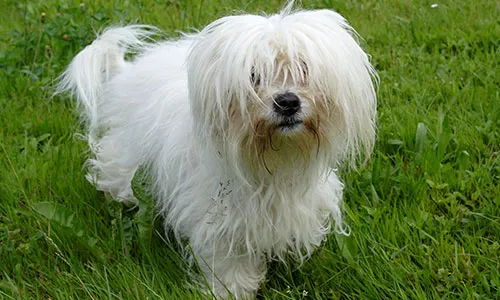 coton de tulearThe Coton de Tulear possesses a distinctive, long, fluffy coat that is considered [hypoallergenic](https://dogcarestory.com/dog-breeds/hypoallergenic-dogs/), making it a suitable choice for allergy sufferers and those seeking a small, low-shedding dog. While Coton de Tulears require daily grooming to maintain their coats, their lighthearted and gentle disposition makes the effort rewarding.
coton de tulearThe Coton de Tulear possesses a distinctive, long, fluffy coat that is considered [hypoallergenic](https://dogcarestory.com/dog-breeds/hypoallergenic-dogs/), making it a suitable choice for allergy sufferers and those seeking a small, low-shedding dog. While Coton de Tulears require daily grooming to maintain their coats, their lighthearted and gentle disposition makes the effort rewarding.
If you’re considering this breed, explore Coton De Tulear puppies on the AKC Marketplace.
Havanese
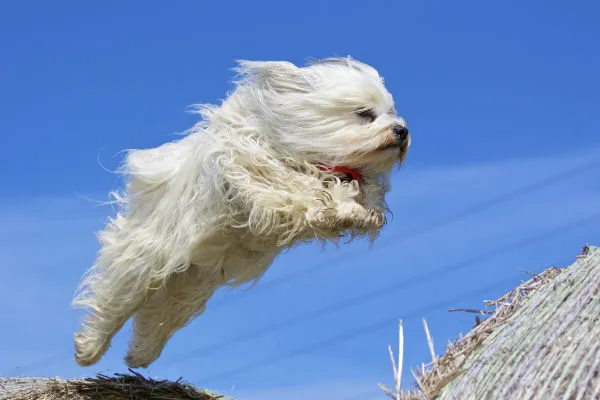 havaneseThese charming dogs, originating from Cuba, offer owners both their signature spunky personality and a non-shedding coat. This means less time spent de-linting furniture and more time enjoying playful romps with your Havanese. Their coat requires weekly brushing and regular baths to keep it clean and healthy.
havaneseThese charming dogs, originating from Cuba, offer owners both their signature spunky personality and a non-shedding coat. This means less time spent de-linting furniture and more time enjoying playful romps with your Havanese. Their coat requires weekly brushing and regular baths to keep it clean and healthy.
If you’re considering this breed, explore Havanese puppies on the AKC Marketplace.
Maltese
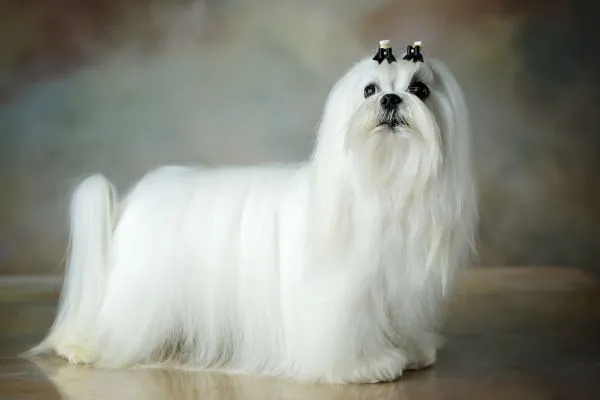 malteseMaltese dogs have captivated human companions for over three millennia. This ancient breed from Malta has remained remarkably consistent over centuries, partly due to their long, white coats that shed very little, making them an ideal lap dog. Regular brushing is essential to prevent matting, and occasional baths help remove dirt and debris from their long, silky hair.
malteseMaltese dogs have captivated human companions for over three millennia. This ancient breed from Malta has remained remarkably consistent over centuries, partly due to their long, white coats that shed very little, making them an ideal lap dog. Regular brushing is essential to prevent matting, and occasional baths help remove dirt and debris from their long, silky hair.
If you’re considering this breed, explore Maltese puppies on the AKC Marketplace.
Lhasa Apso
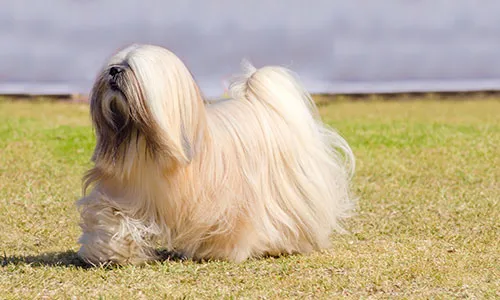 lhasa apsoThis small Tibetan breed makes an excellent companion, offering a calm yet playful demeanor. The Lhasa Apso enjoys brisk walks and relaxing in its owner’s lap. They do not shed, but their coats require maintenance. Many owners opt for a shorter “puppy cut” to simplify grooming and brushing their long hair.
lhasa apsoThis small Tibetan breed makes an excellent companion, offering a calm yet playful demeanor. The Lhasa Apso enjoys brisk walks and relaxing in its owner’s lap. They do not shed, but their coats require maintenance. Many owners opt for a shorter “puppy cut” to simplify grooming and brushing their long hair.
If you’re considering this breed, explore Lhasa Apso puppies on the AKC Marketplace.
Miniature Schnauzer
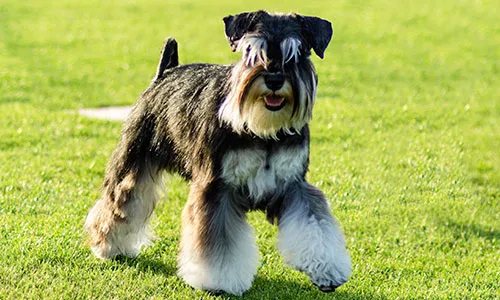 miniature schnauzerThe Miniature Schnauzer is an intelligent, trainable, and cheerful small dog, closely resembling its Standard Schnauzer relatives. This Terrier breed sheds very little, and its adaptability allows it to thrive in both urban and rural environments, as long as it’s close to its people. Weekly brushing and regular grooming are essential to keep Miniature Schnauzers looking their best.
miniature schnauzerThe Miniature Schnauzer is an intelligent, trainable, and cheerful small dog, closely resembling its Standard Schnauzer relatives. This Terrier breed sheds very little, and its adaptability allows it to thrive in both urban and rural environments, as long as it’s close to its people. Weekly brushing and regular grooming are essential to keep Miniature Schnauzers looking their best.
If you’re considering this breed, explore Miniature Schnauzer puppies on the AKC Marketplace.
Poodle
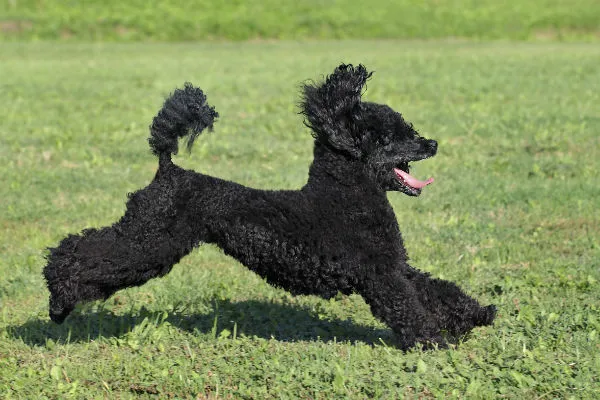 poodlePoodles are widely recognized among small dogs that don’t shed and are considered hypoallergenic. Miniature and Toy Poodles offer these desirable traits in petite, intelligent packages, differing from Standard Poodles primarily in size. All Poodles are highly intelligent, making them easy to train, and they possess an active and proud nature. Their hair requires regular professional grooming.
poodlePoodles are widely recognized among small dogs that don’t shed and are considered hypoallergenic. Miniature and Toy Poodles offer these desirable traits in petite, intelligent packages, differing from Standard Poodles primarily in size. All Poodles are highly intelligent, making them easy to train, and they possess an active and proud nature. Their hair requires regular professional grooming.
If you’re considering this breed, explore Poodle puppies on the AKC Marketplace.
Scottish Terrier
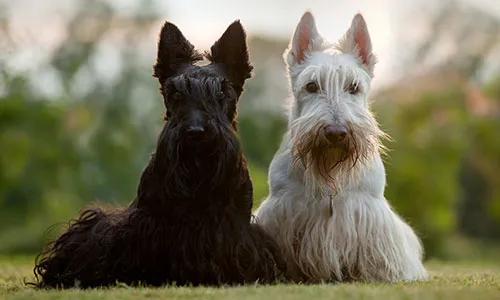 scottish terrierThe Scottish Terrier, often called a Scottie, is a bold, confident Terrier breed with a big personality. Its wiry, weather-resistant coat sheds very little, though regular brushing, grooming, and occasional hand-stripping are necessary to maintain coat health and breed outline. Scotties are intelligent and independent dogs with strong prey drives, requiring owners to be mindful of their interactions with smaller animals.
scottish terrierThe Scottish Terrier, often called a Scottie, is a bold, confident Terrier breed with a big personality. Its wiry, weather-resistant coat sheds very little, though regular brushing, grooming, and occasional hand-stripping are necessary to maintain coat health and breed outline. Scotties are intelligent and independent dogs with strong prey drives, requiring owners to be mindful of their interactions with smaller animals.
If you’re considering this breed, explore Scottish Terrier puppies on the AKC Marketplace.
Shih Tzu
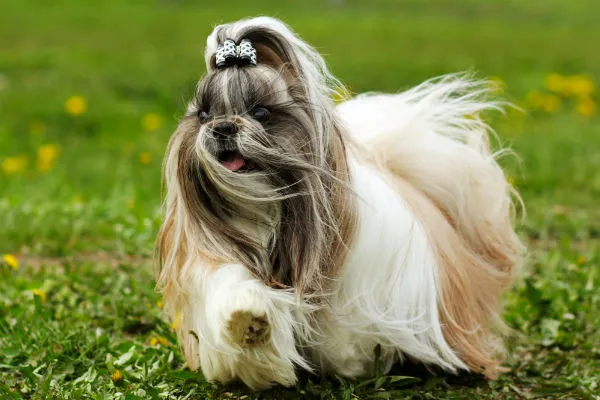 shitzhuThe Shih Tzu boasts a long and distinguished pedigree, having been a favored house pet of the Tang Dynasty. These “little lion dogs” come in various colors and patterns. Their long, silky hair is very low-shedding and looks particularly regal when brushed out, befitting their royal ancestry. This sturdy and lively Toy breed carries itself with an often-described arrogant carriage, due to their proudly held heads and curling tails. Bred as house pets, their gentle and trusting nature makes them exceptional companions.
shitzhuThe Shih Tzu boasts a long and distinguished pedigree, having been a favored house pet of the Tang Dynasty. These “little lion dogs” come in various colors and patterns. Their long, silky hair is very low-shedding and looks particularly regal when brushed out, befitting their royal ancestry. This sturdy and lively Toy breed carries itself with an often-described arrogant carriage, due to their proudly held heads and curling tails. Bred as house pets, their gentle and trusting nature makes them exceptional companions.
If you’re considering this breed, explore Shih Tzu puppies on the AKC Marketplace.
West Highland White Terrier
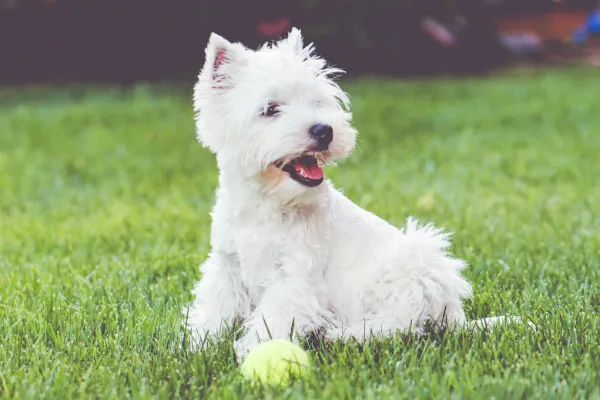 west highland terrierThe coarse, white hair of the West Highland White Terrier, affectionately known as Westies, sheds very little. This sturdy little dog is intelligent, loyal, happy, and highly entertaining. They possess moderate energy levels and a curious nature, along with the independent streak common to all Terriers, which can sometimes make training a challenge.
west highland terrierThe coarse, white hair of the West Highland White Terrier, affectionately known as Westies, sheds very little. This sturdy little dog is intelligent, loyal, happy, and highly entertaining. They possess moderate energy levels and a curious nature, along with the independent streak common to all Terriers, which can sometimes make training a challenge.
If you’re considering this breed, explore West Highland White Terrier puppies on the AKC Marketplace.
Xoloitzcuintli
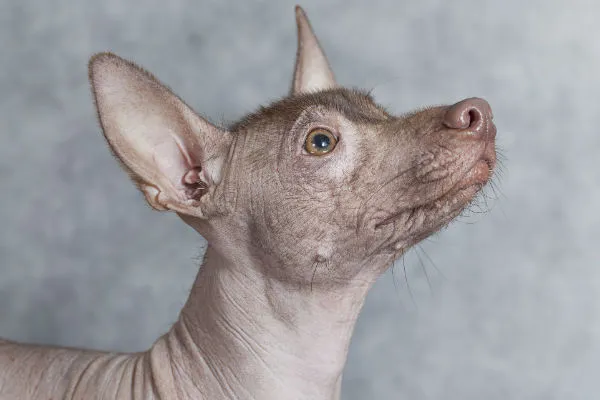 xoloAlso recognized as the Mexican Hairless, the Xoloitzcuintli is an ancient and rare breed that can be either hairless or coated. The hairless variety has minimal hair on its head, while the coated variety sports a very short, fine coat that sheds minimally. As with any hairless breed, the Xolo requires extra skin care to protect it from the elements. Xolos are attentive watchdogs and affectionate companions, and while they enjoy activities like walks and vigorous play, they are known for their tranquil demeanor at home.
xoloAlso recognized as the Mexican Hairless, the Xoloitzcuintli is an ancient and rare breed that can be either hairless or coated. The hairless variety has minimal hair on its head, while the coated variety sports a very short, fine coat that sheds minimally. As with any hairless breed, the Xolo requires extra skin care to protect it from the elements. Xolos are attentive watchdogs and affectionate companions, and while they enjoy activities like walks and vigorous play, they are known for their tranquil demeanor at home.
If you’re considering this breed, explore Xoloitzcuintli puppies on the AKC Marketplace.
Yorkshire Terrier
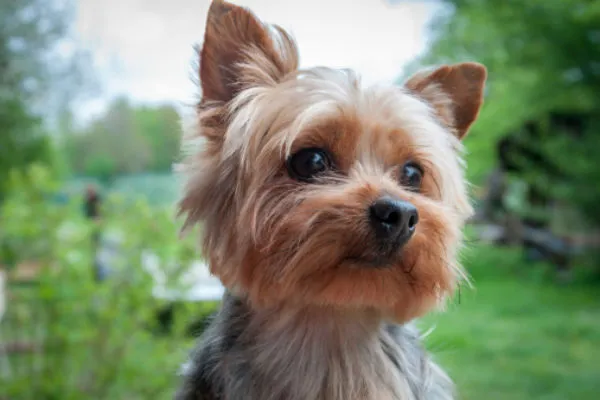 yorkieSprightly, tomboyish, and affectionate, the Yorkshire Terrier, commonly called the Yorkie, is a Toy breed brimming with personality. These spunky lap dogs are a popular choice, and for good reason. Yorkshire Terriers do not shed, and their silky coats are beautiful when brushed daily, a task made easy by their small size. Despite their elegant appearance, Yorkies have working-class roots, having hunted rats in English mills. Today, they are equally content to relax on their owner’s lap as they are to playfully chase a rodent.
yorkieSprightly, tomboyish, and affectionate, the Yorkshire Terrier, commonly called the Yorkie, is a Toy breed brimming with personality. These spunky lap dogs are a popular choice, and for good reason. Yorkshire Terriers do not shed, and their silky coats are beautiful when brushed daily, a task made easy by their small size. Despite their elegant appearance, Yorkies have working-class roots, having hunted rats in English mills. Today, they are equally content to relax on their owner’s lap as they are to playfully chase a rodent.
If you’re considering this breed, explore Yorkshire Terrier puppies on the AKC Marketplace.
Other Small Dog Breeds That Don’t Shed
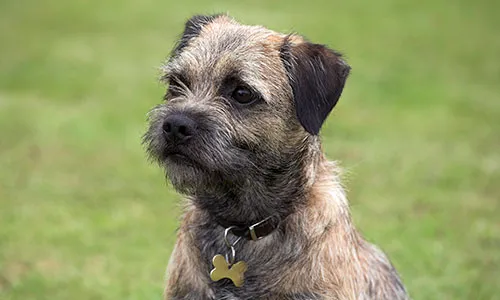 border terrierThe Terrier group includes many small dogs that shed minimally or not at all. Wiry- and coarse-haired Terriers generally shed less than other breeds, making them excellent choices for individuals who dislike excessive shedding. Some other non- or low-shedding Terrier breeds include:
border terrierThe Terrier group includes many small dogs that shed minimally or not at all. Wiry- and coarse-haired Terriers generally shed less than other breeds, making them excellent choices for individuals who dislike excessive shedding. Some other non- or low-shedding Terrier breeds include:
Many small dog breeds shed very little, but it’s important to remember that even non-shedding dogs require maintenance. Thoroughly research non-shedding dog breeds to find one that aligns with your lifestyle and personality. To ensure your pet’s well-being and avoid health issues, always purchase a dog from a reliable breeder, provide a high-quality diet, and schedule regular veterinary checkups.
